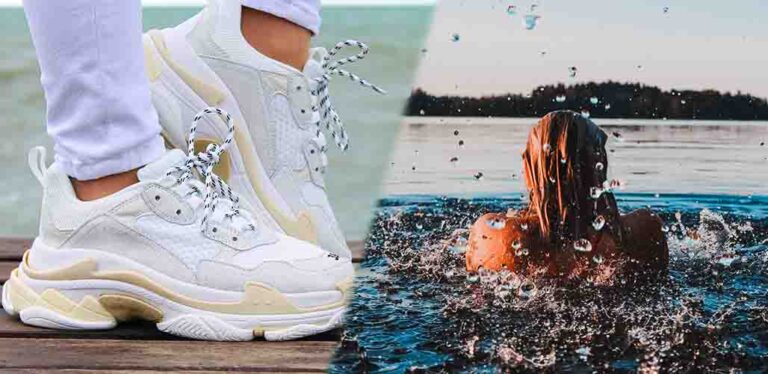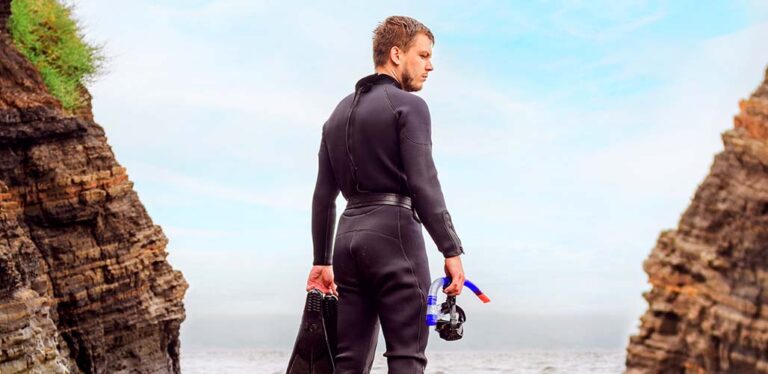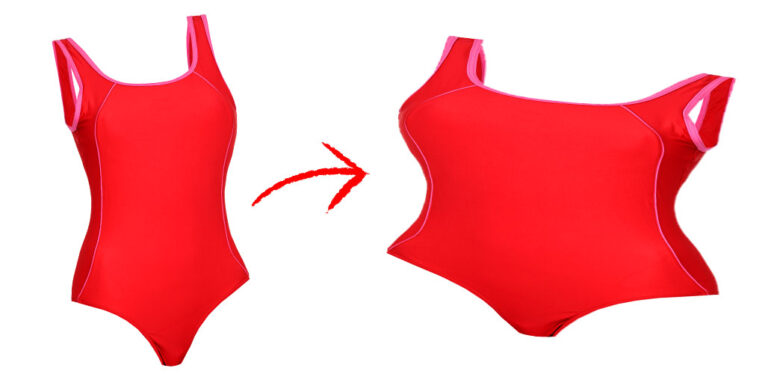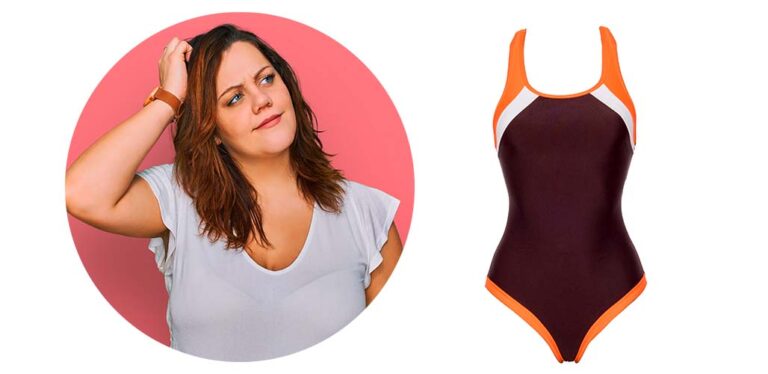Can a Full Wetsuit be too Warm?
Can a full wetsuit be too warm? I usually opt for lots of coverage because I prefer not exposing their bare skin or don’t care about tanning. However, I know some people who find a full wetsuit can be too hot, especially in the pool. And full length suits may adversely affect your swimming experience. Whether or not full suits are too hot will depend on the individual. But, many people find shorter suits too cold, since their body is then in direct contact with the water. The thickness and material used can have a bigger impact. In this article, I’ll take a closer look at this question, including how wetsuits insulate us, and alternative swimwear you can consider if you don’t get on with a longer suit!
Contents
- Can a full wetsuit be too warm?
- How does this swimwear maintain your temperature?
- Why most people don’t get too hot
- Factors that affect insulation
- More FAQs about your swimwear
Can a Full Wetsuit be too Warm?
Full wetsuits do a better job of keeping you comparatively warmer in the pool than short swimwear. They cover your entire skin and reduce your exposure to heat-radiating UV rays. This level of coverage might make you think a full length suit would be stifling to swim in. But, it’s rare that people find them too hot, especially when swimming in the winter or in colder water like the sea.
The standard wetsuit can keep you warmer than you would be without it, but the material is not often thick enough to be stifling – otherwise you’d struggle to swim! Besides, the material used actually allows water to penetrate. So, you can still feel chilly when you’re swimming in cold water. Let’s take a closer look at how this swimwear insulates you.
How Does a Full Wetsuit Keep You Warm?
Although wetsuits are not too warm, they do offer some degree of warmth. Here are the three major benefits of full length suits, and the ways that they will keep your body temperature up.
1. They Create an Insulating Layer
Wetsuits let in a layer of water between the material and your skin. This water is warmed up by your body temperature, so it’s actually your own body heat keeping you hot!
2. They Cover You Up
A full wetsuit covers your entire body during swimming. This has dual benefits. For starters, it helps reduce the loss of body heat considerably. Additionally, most people aren’t comfortable showing the amount of bare skin that regular swimsuits expose. Full wetsuits can help cover your body while providing more warmth.

3. Thermal Wetsuit Provides Insulation
A thermal wetsuit can improve overall insulation and reduce skin heat loss. According to the Journal Of Physiological Anthropology, thermal wetsuits help sustain higher body temperatures. They also allow more thermogenesis from shivering compared with regular swimsuits.
Don’t Forget the UV Protection!
Although this isn’t necessarily a way that wetsuits keep you at a comfortable temperature, it’s worth noting this huge benefit!
Most swimsuits are pretty revealing, which means a large portion of your skin is exposed to harmful UV radiation. The International Journal Of Molecular Sciences states that exposure to UV can potentially result in skin cancer and promote excessive growth of a preformed tumor. Moreover, it can also cause aging, sunburn, and severe skin problems.
According to the Textile Research Journal, each swimwear has a UV protection factor (UPF). The UPF is a numbered assessment of the number of UV rays the wetsuit can block. Full wetsuits often have a higher UPF factor. They significantly limit your exposure to UV radiation and protect you against its negative effects on the skin.
Why is a Wetsuit Not Too Warm?
Many people find that the slight warmth wetsuits produce is insufficient to keep them warm in cold waters. This is why they come in various designs. The thicker your material, the warmer they will be. So, the best suit for you might depend on where you’re swimming. Here are two reasons why a full wetsuit is not too warm.
Wetsuits Aren’t Waterproof
As I’ve already mentioned, wetsuits work by letting in a layer of water, which your own body heat warms up. But, this water won’t be warm when it first comes into contact with you. It will take some time for the water to heat up. So, you’ll most likely feel cold for a while as you jump in and get started with your swimming.
Wetsuits Are Stretchable
Wetsuit materials like nylon and polyester are stretchable and offer less drag in the water. This is great for your swimming ability, but might make you suffer from some extra chill!
You might also be surprised to learn just how many people choose a wetsuit that doesn’t fit them correctly. These suits are designed to be very tight, like another layer of skin! But, some people find this uncomfortable, or harder to swim in, so they choose a larger size. These loose and stretchable wetsuits aren’t typically in close enough touch with your skin to insulate you.
3 Factors On Which Wetsuit Warmth Depends
The level of warmth full wetsuits provide is variable. The most notable factors on which this characteristic depends include:
1. Wetsuit Thickness
The material thickness determines how well it performs in keeping you warm. Thicker wetsuits trap more heat and are warmer. You should think about your swimming style, location, and the water’s temperature before deciding the thickness of your suit. Also, take into account your tolerance and sensitivity to cold water.
2. The Type of Material
Different fabric materials have different thermal insulation capabilities. Nylon, polyester, spandex, or lycra used in manufacturing wetsuits have relatively low thermal insulation power. Neoprene, however, has a considerably higher ability to keep you warmer and is used in making high-quality thermal wetsuits.
3. Wetsuit Fitting
The fitting of your wetsuit is a significant factor in determining the warmth it provides. Tightly fitted wetsuits do not allow large quantities of water to penetrate through and are, therefore, warmer. The water they trap won’t circulate, and will get warmed faster by your body temperature. Conversely, loose wetsuits have more channels for water to circulate through, maintaining a lower temperature as your body loses heat.
Are Full Wetsuits Warmer?
Full wetsuits are warmer than typical swimwear that exposes a lot of skin. However, they aren’t usually too warm to keep you covered in cold waters. So, you might still feel chilly swimming in the sea or during winter.
What Can I Wear to Keep Warm in the Swimming Pool?
Full wetsuits will help to keep you warm in the pool. But, choose the thickest material you can if you tend to suffer from feeling too chilly. As I’ve already mentioned, neoprene is the best material for insulation. These might be marketed as thermal wetsuits. Try the suit on in store and speak to staff for further help finding the right costume for you.
The International Journal of Sports Medicine indicates that competitive swimmers perform better in wetsuits at 18 degrees centigrade water temperature. This is why it’s advised to use them for open-water swimming events when the water is between 18 and 20 degrees centigrade.
How to Stay Warm When Swimming in Cold Water
Besides wearing a thermal wetsuit that can keep you warm, consider using swimming accessories made of neoprene, which can add a layer of warmth. Closely fitted neoprene vests, gloves, swim caps, and socks will protect the parts of your body that a wetsuit doesn’t cover.
And, make sure you have a nice dry towel and a dry change of clothes waiting for you outside the water. Drying off quickly once your swim is over will help you feel better in no time!
Can a Full Wetsuit be too Warm? Final Thoughts
A full wetsuit can be too warm for some people, particularly if you’re swimming in a heated pool. But, you might find it not warm enough if you’re swimming in the sea or another cold body of water! Choose neoprene for the best level of insulation, and a thicker suit for staying as warm as possible!
More Wetsuit Questions Answered
- How do I keep my wetsuit clean?
- Why is it so hard swimming in a wetsuit?
- Should I wear a bikini under my suit
References
- D’Orazio, J. (et al), ‘UV Radiation and the Skin’, International Journal of Molecular Sciences (2013)
- Kursun Bahadir, S. & Özcan, G. ‘An Investigation of UV Protection of Swimwear Fabrics’, Textile Research Journal (2010)
- Wakabayashi, H. (et al), ‘Thermal Insulation and Body Temperature Wearing a Thermal Swimsuit During Water Immersion’, Journal of Physiological Anthropology (2006)
- Párraga, A. (et al), ‘Swimming with Swimsuit and Wetsuit at Typical vs. Cold-Water Temperatures (26 vs. 18°C)’, International Journal of Sports Medicine (2021)







